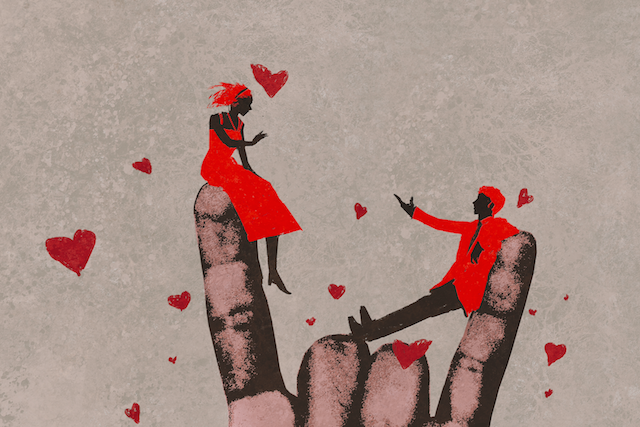
“One reason people resist change is because they focus on what they have to give up instead of what they have to gain.” ~Rick Godwin
Dave and I met earlier this January. I was immediately attracted to his aquamarine eyes and his tattoos. I met him on the eve of my twenty-sixth birthday and, based on our interaction, I assumed we’d have a casual fling. Things didn’t end that simply, to my surprise.
When we were lying in bed together that first night, holding hands, he turned to me and asked if there was any chance we could get to know one another without sleeping with other people.
This was strange to hear, but as a single woman in Los Angeles, I felt as though I had stumbled across some sort of rare species of man who was actually interested in pursuing a commitment without me having to do much.
A part of me felt caught off guard and suspicious, considering I’d made it clear that this was just supposed to be a hook up. On the other hand, it was kind of nice that someone who I was incredibly attracted to wanted to get to know me exclusively. In retrospect, I realized that it filled me with this feeling of warmth that I’d been deprived of before I’d met him.
Within five days, Dave asked me to be his girlfriend. Although I found his eagerness to jump into a relationship to be a bit off, I agreed because I liked him and wanted to go with the flow.
The first few weeks were amazing, as we shared intimate conversations, romantic outings in Los Angeles, amazing sex, gifts, and the beginning of what felt like something that could blossom into a true partnership. However, the passion was intense, and we hadn’t had much time to develop authentic trust. It became increasingly evident to me that this relationship would be a ticking time bomb.
Within a month and a half, I was overwhelmed with Dave’s jealousy, suspiciousness, and paranoia. He was becoming increasingly controlling and accusatory toward me.
I was incredibly loyal to him and began to resent feeling like I was always doing something wrong when I was trying my best to be a good girlfriend. His gifts started to seem like a farce—like he had simply gotten me them to possess me instead of genuinely liking me for who I was.
I broke up with him a few times because I couldn’t tolerate his jealousy and the way he degraded me. However, I would go back to him because I’d remember the good times and was becoming addicted to the kind of intensity he provided for me.
I would question myself and think perhaps I was being too critical; after all, no one was perfect, and I should be flattered that someone was evidently so invested in me. I was in it too deep to see things clearly and make the right decision.
When he and I would split, I’d attempt to get out there and date others, but no one was able to elicit the same warmth and stimulation I’d felt from him. So I’d go back to him. Just three months into this, we’d already established an on-and-off relationship that began to deteriorate my mental, emotional, and physical health.
The fourth and final time we broke up ended with him yelling at me in public. I had wanted to leave a particular bar because I’d had an anxiety attack, and he accused me of wanting to exit because of “some guy” there. He was totally delusional. There was no guy in the bar I was trying to hide from him.
I remembered chasing Dave after he’d stormed out from the bar and thrown money at me, demanding I take a bus back to my house. I was actually crying on the street chasing him while he yelled at me! I hated myself and the woman I’d regressed to.
For comedic relief, there were two women watching us fight, standing outside a movie theater eating popcorn.
“Don’t chase him, girl,” they told me. “He’s mean. Look at how he’s yelling at you. You deserve better.” Dave cussed at the girls before running off. I stopped chasing him. I came to my senses. It was brutal, but I realized that this relationship just wasn’t worth all the pain anymore.
Part of me hates myself for letting myself get involved in such a clearly self-destructive relationship. I would like to say that this is my first on-and-off relationship, but it isn’t. Based off my experiences and observations, it seems like once you’ve been in one on-and-off relationship, you’re prone to more.
Why couldn’t I just walk away the first time I broke up with this guy? Why do we get hooked on the drama of on-and-off relationships? Here are some theories I’ve formed.
1. Life wasn’t much better before.
Looking back, I recognize that I wasn’t in a solid place in my life before I met Dave. I was bored and at a crossroads with my career. I was highly susceptible to getting caught up in something like this because I was unhappy with my life and the drama provided both stimulation and a nice distraction.
2. Pain felt familiar and comfortable to me.
Even though Dave had shown me his mean streak within a month of dating, I stuck with it thinking I deserved it and that I should endure it for the greater good. My parents often shamed, invalidated, and criticized me when I was growing up, and as an adult I’ve been attracted to partners who do the same.
3. I wasn’t clear on my deal breakers.
I knew I was turned off by extreme jealousy, but I didn’t know it was a deal breaker for me at the time. Now, looking back, the deal breaker I’ve settled on is being degraded or humiliated for someone else’s uncontrollable jealousy.
4. I developed an addiction to him and the drama.
I’d become addicted to Dave, the sex, and the whole act of reconciling. There’s something intoxicating about the highs that follow the lows. It’s a cycle many are familiar with, and I am one of the lucky ones that got out of this relationship before it became even more destructive.
—
Now that I’m armed with this knowledge, I’m going to focus on understanding and working on my masochistic behavior. I’m going to get more clarity on what my deal breakers are and make sure to end things once I feel someone isn’t respecting them.
I’m sure there are some on-and-off relationships that end up working out, but in my experience, the whole act of repeatedly getting back together and breaking up undermines trust. I’d love to hear any experiences you’ve had with on-and-off relationships and any insights you’ve formed.
About Monica Viera
Monica Viera is a novelist who lives in Los Angeles, California. She is best known for her novel Crazy Meeting You Here.













 Though I run this site, it is not mine. It's ours. It's not about me. It's about us. Your stories and your wisdom are just as meaningful as mine.
Though I run this site, it is not mine. It's ours. It's not about me. It's about us. Your stories and your wisdom are just as meaningful as mine.
Great article, thank you for writing this. Going by the behaviours you describe regarding your boyfriend, I would suggest it sounds like he had BPD. I have only recently understood this about my now ex partner who had many of the behaviours you mention, including the love bombing right through to devaluation. It is a definite cycle of behaviour which unfortunately I have only understood so very late, after nearly 25 years…..but better late than never.
Most importantly it is about recognising your own codependent behaviours and to break the cycle, in spite of loving the person still.
What you have mentioned is spot on.
Quora has some excellent posts which have helped me on my journey in recovering from this relationship.
I also recommend this to others who are healing from such a relationship.
Many thanks for sharing your experience. Going throıgh a very similar experience and after the 4th brake up I am thinking why being stuck in such an experience. Although not sure how to fix this and stop living such an unhappy life, I also developed a few theories myself.
– scaredof being lonely: although surrounded by great friends and family the absence of a soulmate is scary for me
– sex:
– previous experiences: having gone through similar experiences before started to wonder if I am somehow attracting this kind of men.
– blaming myself: even though in most fights I believe I was in the right, after missing him for a while I start blaming myself. For example our latest brakeup was after my boyfriend and a pal of his hooked up in a bar with a couple of woman for a few drinks. Next day he came to me and told me about this and when I reacted to it he started yelling at me to a point to tell me that if I was unhappy about this I could leave him which I did. A few days later with so many friends telling me that he was just having drinks and I over reacted, I started to think whether I did over react although I still believe if you are in a committed relationship you should not behave this way.. so events like this always made me go back to him and now I am trting to let such a tozic relationship go..
Monica, thank you for describing your toxic relationship pattern here. I too had the same type of thing occur in my life as well. I’d actually fallen in love with a woman while I was still living with my wife. As you stated, I was unhappy, living in an already toxic relationship and seeking excitement and validation elsewhere.
The person I chose had a lot of issues- insecurities beyond belief,jealousy, would constantly project fears, stonewalling, gaslighting etc. Her distrust of me (for obvious reasons) was unbearable most days even though I was 100% devoted to her and had no desire to cheat on her, yet had cheated on my wife with her. Terrible judgment on my part.
We did manage to have a relationship for four years, but it was a rocky road the entire time. Like you, I got addicted to the highs after the lows, the exhilarating sex and the seemingly deep soul connection. We believed that we’d shared multiple lives in the past in one capacity or another.
What I realized after the fact was that this all was very familiar to me. Choosing someone to validate me was based on my own childhood experiences with an alcoholic mother who had her own abuse history. It was merely an unconscious cycle repeating itself.
Without attaching labels such as BPD, or NPD, the flags were all there from the beginning and I chose to put the blinders on and ignore the obvious. My ego got in my way and I truly believed that she would not treat me the same as her past partners. The reality was that she’d fine tuned her devaluation and discard tactics to a tee. I look back and thank goddess this person and this dynamic is no longer a part of my formerly confused life.
I have learned what I needed to learn and DO believe that she was the mirror I needed to see in order to change my life for the better.
I know my triggers now, as well as my deal breakers and am so much wiser for this learning experience. The on/off again aspect is real and debilitating. Every time you go back to that, it erodes your self confidence and your being. The road to recovery is hard, yet to worth it. Blessings!